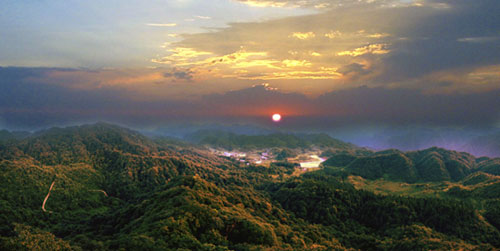
Zunyi City in Guizhou Province is wedged between the Sichuan Basin and Yunnan-Guizhou Plateau. The scenery that surrounds the city is stunning in its variety – mountains, gorges, rivers, caves, hot springs and more.
Suiyang County is perhaps the most scenic area under the administration of Zunyi City. Locals refer to Suiyang as China’s Great Natural Geological Museum. On visiting Suiyang, I found myself in agreement with the local assessment. The county really is one, big ode to the power and beauty of nature.
Human Context
Suiyang’s natural wonders have made it popular with Chinese people for thousands of years. The county is well known as the haunt of many a man of letters, who would come here to seek inspiration from the landscape. Today, tourists visit Suiyang to pay homage to the poets, writers and artists who developed their talents here.
Suiyang appears under various names in historical records. It took on its current name in 611, when the Sui Dynasty set up a county administration in the area. “Suiyang” finds its etymological origin in a line from the Book of Odes, a Chinese poetry classic, and means “peace and abundance.”
Suiyang saw its first golden age during the Tang Dynasty (618-907), when it was selected as the capital of Bozhou Prefecture and became West China’s creative center for art and literature.
Suiyang was the first among China’s western regions to embrace the civilization of the more developed Chinese hinterland. During the Eastern Han Dynasty Yin Zhen (79-162), a Guizhou native, founded a school in Suiyang to teach Confucianism and calligraphy, and taught classes there for 13 years.
The name “Suiyang” is inextricably linked with the legacies of the best poets of the Tang Dynasty. In the west of Suiyang town stands an ancestral temple of the Bai family, the scion of the Tang bard Bai Juyi (772-846). In the east of the town is the private mansion of the Du family, relatives of Du Fu (712-770), another prominent Tang poet. Huaibai Hall, built to commemorate Bai Juyi, is said to be the former residence of Li Bai, one of China’s most celebrated poets even to this day. Li Bai penned volumes of exuberant, romantic and surrealist verse during his exile to the region.
After Chen Zi’ang (661-702), one of the most prominent scholars of the early Tang Dynasty, died in prison under trumped-up charges, his children moved to Suiyang to escape further persecution. Liu Zongyuan (773-819), a celebrated writer, philosopher, Confucian thinker and successful politician, established a school in the region during his tenure in Bozhou Prefecture. The school originally bore his name before being renamed the Ruxi Academy.
Thanks to this legacy, a passion for poetry runs deep in the veins of Suiyang locals. Over the thousand years from the Song (960-1279) to Qing Dynasty (1644-1911) more than 50 famed bards were Suiyang natives. This list has continued to grow since the founding of the People’s Republic, with the likes of Liao Gongxian, Li Famo and Du Xingcheng gaining national renown. To cater to local poetry lovers, of whom there are many, Suiyang now publishes the Hometown of Chinese Poetry, the most widely read magazine in China run by an individual county.
